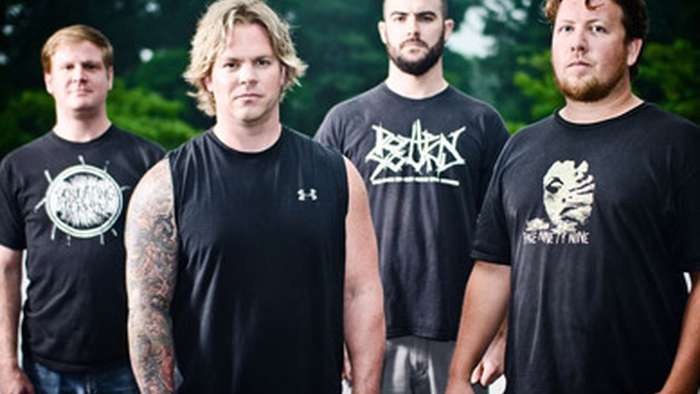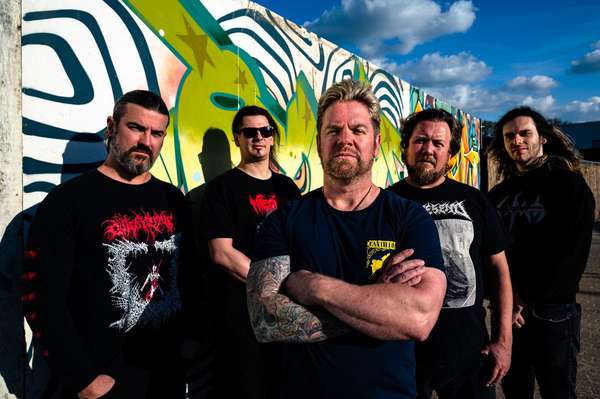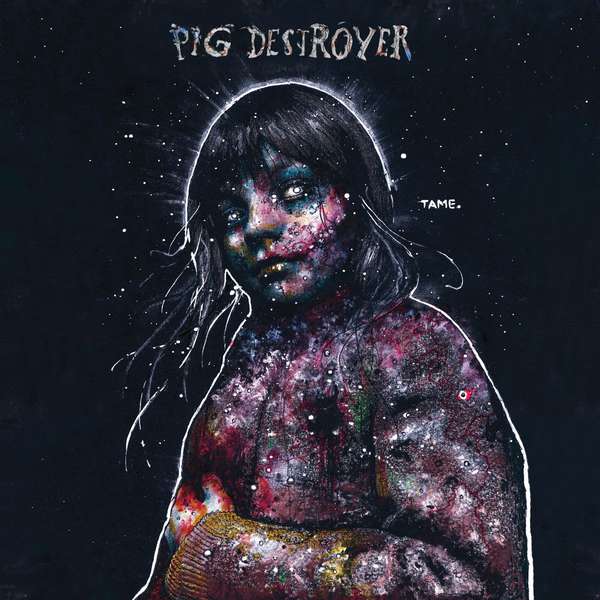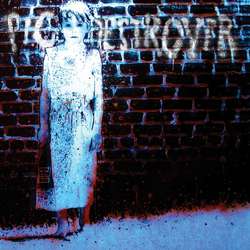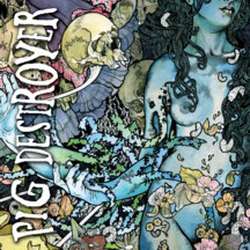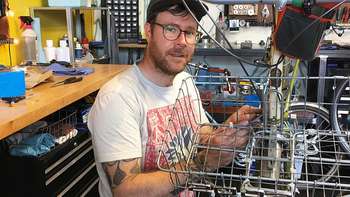
SPB ran into J.R. Hayes, vocalist of Pig Destroyer, after the band had blown everyone away during a headlining set at the 5th annual Noctis Metal Fest in Calgary. Hayes broke down his influences, his writing style, and his general outlook on religion and society. Standing in a poorly lit alleyway outside of the venue, he went on to explain why grindcore still matters and proceeded to offer me and my friend shots.
Pig Destroyer recently released Book Burner on Relapse Records.
Scene Point Blank: Since your last album you’ve gone through some member changes. You recruited Adam Jarvis from Misery Index. How did that come about and what particular skills do you think he brings to the table?
J.R. Hayes: Well, we had built our studio in Scott [Hull]’s basement and that took us awhile. Then, me and Scott worked on the Agoraphobic Nosebleed record for awhile. Then when it came time to do a Pig Destroyer record, we got about 5 songs in and everything kind of came off of the rails. We had to part ways with our drummer, which sucks, ‘cause he had been with the band for a really long time. We had tried to get things going with Dave Witte (Municipal Waste, Burnt By The Sun, etc.) for a little bit. We had jammed with him for awhile, but that just didn’t work out because he’s a busy guy. But Adam wanted the job from day one. Once he came in, he owned it. He’s really that good. He’s just a great drummer. All he wants to do is play drums and that’s all we can ask for.
Scene Point Blank: Book Burner comes out October 23rd how do you feel your new album stacks up against your previous releases?
Hayes: It’s kind of unusual for me because I’m a really hypercritical person so I don’t really sit around and listen to my own records very often, but this is the first one where I can actually just throw it on and play it and get down to it. So that’s a pretty cool thing for me. I like it a lot better than our last record, I do like the last record we did but, I’ve never been a fan of long songs, that’s why I’m in a grindcore band. So I was really happy on the new record that we had gotten back to some of those really short, minute-long, crazy songs. I think it’s got a little bit of everything that we’ve ever done and if you’re a fan of Pig Destroyer then you’ll probably get down with it. The one major change about it is that in the past we’ve used a lot of distortion on the vocals and layered a lot of vocals just to try to make things sound as crazy as possible. On this record we kind of stripped it down a little bit and it’s more natural and close to how I sound normally. We also added some extra people singing, which we hadn’t really done that much of in the past. It does have a slightly different vibe in that respect.
Scene Point Blank: How much of writing in your previous works tends to influence the newer work of Pig Destroyer?
Hayes: I don’t know. We don’t necessarily think about the old records when we write the new record. It is more just what comes naturally to Scott. He’s got to get on a kick. He’ll start listening to some D.R.I. or some old Sore Throat, something like that just to get in the mode. It’s always been the same recipe for us. Every time we make a record it seems to come out differently. But, I think, you just seem to grow as people. It has been a long time since we did a record, so of course it’s going to sound a little bit differently.
Scene Point Blank: Included in the album is the short story “The Atheist,” written by J.R. Is the story directly predicated upon your fears of religion?
Hayes: I don’t have a fear of religion, I have already been through it. Once you come out on the other side there’s really nothing to be scared of. I think, for me, my mind functions on a Mr. Spock level. I’m a logical, hypercritical person and there’s not a lot of logic to be found in religion: you have to take a lot of things on gut. The whole concept of faith is just a foreign concept to me. The story wasn’t meant to be negative about religion as much as it was meant to focus on the main character, the atheist in the story. How far he is willing to take his beliefs. It’s one thing to be an atheist in the United States because you can get away with it since you have that freedom. Then if you go to someplace else and you’re the only guy, then you have to make some serious fucking decisions. How far are you willing to go? The character leaves his wife, his job—he leaves society basically—because he just can’t do it. That is more of what it’s about.
Scene Point Blank: Do you think the post-apocalyptic world in “The Atheist” is a legitimate fear of today?
Hayes: No, it is a piece of fiction. I know a lot of religious people, a lot of people in my family are religious. I don’t necessarily think that Christianity is going to ruin American society or anything like that. I was just on a kick last year where there was about 3 to 4 months where all I did was watch religious debates, study theology and philosophy. That (the story) was just an accumulation of all of these different things that I was coming in contact with. That was me trying to put all of this into a fictional context. That’s what fiction is all about. In some ways, I think that fiction is the only place where you can tell the truth and bring all of those disparate things together.

Scene Point Blank: How do you feel, conceptually speaking, that the lyrics, short story, and the sound of the album tie in together?
Hayes: I think there are some themes of isolation, desperation, and just the urge to escape modern society because it can be suffocating at times. It is all tied together rather loosely because there are versions of the record that don’t have the story so I didn’t want it to make it so you couldn’t enjoy the album with the story. That said, it is very loosely connected but there are some themes that tie together. I think that is all because it comes from the same brain.
Scene Point Blank: With the new album you guys recorded a EP of covers of older hardcore songs. What was the impetus behind this and how do you feel these bands have influenced your sound and ideologies?
Hayes: Well, Adam’s a bit younger so he doesn’t know as much about the '80s hardcore stuff. He likes it but he didn’t grow up on it like the rest of us (the band). I feel like we have always been equally influenced by both hardcore and metal. We sound like a metal band but, when we play, we play like a hardcore band because we’re a little sloppy. I love death metal but sometimes when you see death metal bands play live they can be a little cold because they just seem to stand there and they just want to hit all of the notes. Technically, it’s great. If I was a guitar player or a drummer I might be able to appreciate it more. I’ve always been more of a fan of the more visceral, getting nasty and dirty vibe that hardcore is known for.
Scene Point Blank: Do you feel trapped by your genre, or expectations that people have regarding that genre? How does that feeling tie into your writing process?
Hayes: I’ve never really felt the urge to be particularly experimental. If I felt that urge I would just start another band. You’re only as trapped as you feel you are. I feel that can be a self-fulfilling prophecy. Meaning: if you think that you are trapped, then you probably are trapped. For some reason we’ve never gotten sick of playing grind. It’s just what we’ve always loved and it is still just as exciting, if not more exciting, as it always has been.
Scene Point Blank: Do you think Pig Destroyer will branch out into other genres in the future?
Hayes: Well, when we did Phantom Limb that was the only record where had gone into a proper studio. We were on the clock which was very unusual for us. Luckily, we were well rehearsed and we busted the album out pretty quickly. We had a couple reels of tape left over so we did some new shit that we have never released. We are going to try to add some new shit to that and put that out. I just love playing fast music. A big influence on Scott and I was always the old crossover stuff like Corrosion of Conformity and Cryptic Slaughter. Thrash metal is great, hardcore is great; you put the two together and it’s like chocolate and peanut butter, man.
Scene Point Blank: You guys performed for the Scion music festival back in 2009. Can you tell us what kind of experience that was?
Hayes: It was really cool. We got to play with a lot of awesome bands. Torche was there and we played right before Boris, who I had wanted to see for a very long time, and Neurosis played that night. I had reservations about the Scion thing at first because corporations are scary sometimes, but they have always been totally cool. We know the guys who are associated with that and they love the band. If they honestly want to support the band then I’m not going to say no. If it’s good enough for Neurosis then it’s good enough for me.
Scene Point Blank: How do you feel about companies providing services to independent bands (e.g. relating to Scion releasing records for various bands)? Have you been approached in this context and would there be any reservations in doing something such as that?
Hayes: I felt bad about those bands, especially Magrudergrind, getting a backlash about doing that because I thought that was pretty lame. Scion’s offering to put out a free record. How can you shit on a free record? I don’t care if Dunkin’ Donuts sponsored it, it’s fucking free. It’s the music that should count. There are a lot of bands and albums that I love that came out on major labels or came out on things that suck. If the music is great then everything else doesn’t matter so much.
We have actually played a lot of Scion-sponsored shows, with Brutal Truth and Trash Talk—just awesome bands. Like I said, as long as they’re doing it for the right reasons, and I think they are, then I’m cool with it. I also understand why people get uncomfortable with it.
Scene Point Blank: What are you guys’ personal views on social networking’s place within independent music? How has it helped or hurt Pig Destroyer?
Hayes: I think it is all a matter of perspective. I am kind of a lurker, I go on the internet I don’t post or have a Facebook page. There are maybe 2 people I email with. I’m kind of out of the loop but, any time you can get in touch with other people who are involved in the same kind of shit you are, then I think that that is pretty awesome. I live in the D.C. area so, right there, there are millions of people; you have a scene there, a scene in Baltimore, and Richmond. There are a lot of places, like Maine, where kids might be more isolated and social networking can be good for them because it can bring them closer to something. What was their option before, go to Walmart and buy a Billy Ray Cyrus album? It gets people involved and I think that that is very important.
Scene Point Blank: Do you have anything to plug or anything else you’re working on outside of Pig Destroyer that you would like to talk about?
Hayes: I do do some writing on my own but I have a full-time job, so everything else comes down to trying to find time to finish. Maybe I’ll do a book at some point.
Pig Destroyer is going to have a few flexi discs coming out soon, one of which will be in Decibel magazine, one will be live material, and the other will be original material. So we’re going to get cranking on that pretty soon.
